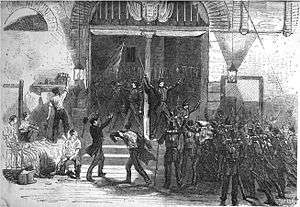Pronunciamiento
A pronunciamiento (Spanish: [pɾonunθjaˈmjento], Portuguese: pronunciamento [pɾunũsiɐˈmẽtu]; "pronouncement, announcement or declaration") is a form of military rebellion or coup d'état particular to Spain, Portugal and Latin America, particularly in the 19th century.
Overview

In a classic coup d'état a rebel faction which controls some critical element of the armed forces seizes control of the state by a sudden movement, organized and executed in stealth; in a pronunciamiento a group of military officers publicly declare their opposition to the current government—that is, to the current chief executive and cabinet (who may be legally elected civilians or the result of a previous coup).
Generally, a pronunciamento is preceded by a period of preparation during which the organizing officers "sound out" the larger community of officers to determine if their views are widely shared. After the pronunciamiento the would-be rebel officers then wait for the rest of the armed forces to declare for or against the government. [1]
There is no fighting at this point; if the rebellion has no support the organizers lose. They may have to flee the country or retire from the armed forces, or they may be arrested. If the bulk of the armed forces declare in favor of the pronunciamiento the government resigns. It is similar to a vote of no-confidence, except that it is issued by the armed forces, not by the legislature.
One example of a pronunciamiento was the successful rebellion of September 1868 against Isabella II of Spain, by Generals Juan Prim and Francisco Serrano.
Another was the 1932 rebellion against the Spanish Republic by José Sanjurjo (known as the sanjurjada), which failed.
In Mexico, where such declarations were often quite detailed, formal, and issued as written texts, they were given the name of plans.
The Spanish Civil War that commenced in 1936 was not started by way of the typical pronunciamiento. Hugh Thomas writes in his authoritative text on the Spanish Civil War that, "Mola's plans were made clear in a circular in April. The planned rising was to be no pronunciamiento of the old style. Two branches of the plot, one civil, one military, were to be set up in all the provinces of Spain."[2]